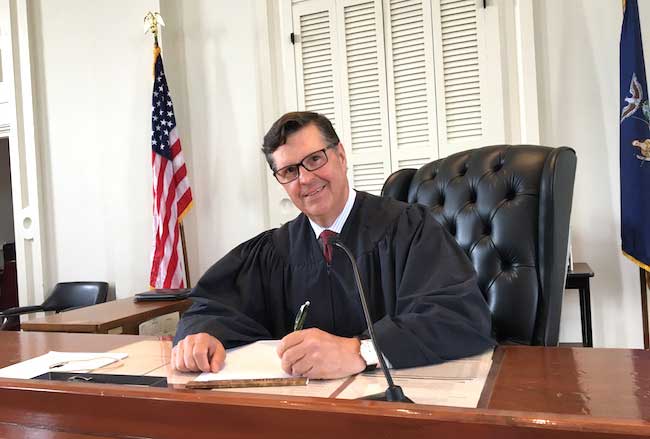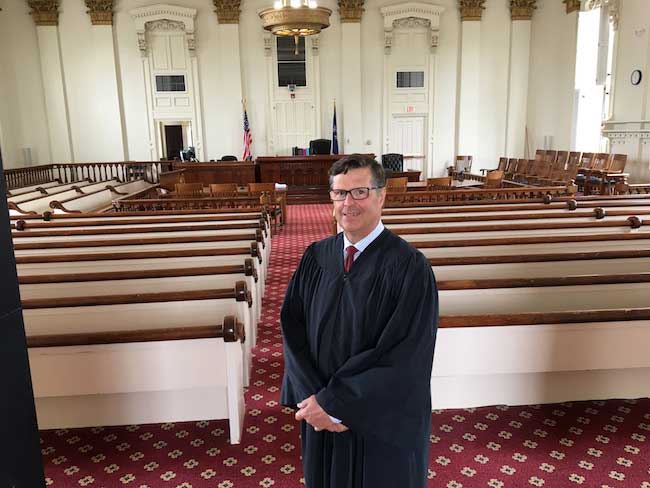Q&A: Judge Punch says opioid crisis biggest change in nearly 30 years on bench
‘The opioid crisis is different because it seems to cross over all social, economic and other lines. We’re seeing people from nice families … who are in serious trouble because of these drugs.’ – Judge James Punch
ALBION – Orleans County Court Judge James Punch retired on July 29 after nearly 27 years as the county judge. Punch, 62, worked five years as district attorney before he was elected judge.
After his final court session last Friday afternoon, he sat down for a 25-minute interview with Orleans Hub Editor Tom Rivers.
Q: I’d like to talk about some societal changes since you’ve been judge. Nearly 30 years ago I don’t think the court volume was nearly what it is today.
A: Things have certainly changed. I could enumerate on some ways society has changed.
Q: You have a very good vantage point.
A: Good or very bad, depending on how you look at it. I think the biggest change in the last 30 years is the change in people brought about by the opioid crisis. I’ve never seen anything like it and I’m going back farther than 30 years, it’s closer to 40 as an attorney. I guess it would be 38 years starting as a defense attorney, a Family Court attorney, then later as district attorney. I actually started out as a Legal Aid lawyer for a year.
So I have pretty much 1980 from today as a reference point. The drug use that we used to see – in the old days it was heroin and then crack cocaine started coming into the area around 1986 – it seemed there was limited populations using those drugs.
The opioid crisis is different because it seems to cross over all social, economic and other lines – geographic. We’re seeing people from nice families whose parents have actually tried who are in serious trouble because of these drugs.
Quite honestly I don’t think we have as a court system a good way of dealing with it. I’m not sure there is one. We have to keep things together at the seams with a certain amount of punishment for the sellers and at times possessors. I still believe in drug court but I think it’s much harder to get someone through drug court with a heroin or opioid habit than it was before when it was typically a cocaine or alcohol problem.
They just seem to go back to it. It’s a much more powerful addiction. It has to be a combination of the courts and public health in order for it to work and I’m not sure how that can actually in practice be implemented. But I think they have to start looking at it differently and I think they are.
That’s the biggest change I’ve seen.
‘Things have changed a lot. I don’t want to be an old fogey and say how great things were in the old days, but things have gotten a little be shaky these days.’
The other big change I’ve seen is there seems to be a general change in the way people look at government institutions and authority in general. When I started for example the jurors wore coats and ties, and the ladies wore dresses. It’s much different now. You’ve seen it.
As a judge or police officer, you were respected. There was a presumption that you would be respected until you did something to lose that respect. Now it’s the inverse where you’re not respected in these positions until some individual sees a reason to respect you. That also cuts across a lot of lines with the clergy, doctors, lawyers, judges, police.
That’s made it a little bit trickier to try to enforce these laws when people are less apt to accept your authority. That’s a bad thing for society, but you have to deal with. In any of these positions you have to be very careful and behave as ethically as you can, and don’t give any appearances of unethical or irresponsible conduct, and then just hope for the best.
So there’s two changes.
As far as the numbers go (for caseloads), when I started the numbers were quite a bit lower than they are now. They really peaked in I’d say the mid-’90s when they were very high. Then they levelled off for a few years. In the last few years, not only in my courts but in the neighboring counties, family court has actually decreased. That’s in the last three or four years. I’m not sure why. It could be demographics.
Q: I’d be inclined to think we have less families in the community now given the enrollment drops in local schools.
A: I think it could be. I know the divorces, the raw numbers, have gone down and that’s because fewer people are getting married.
Things have changed a lot. I don’t want to be an old fogey and say how great things were in the old days, but things have gotten a little be shaky these days.
Q: I wonder, and I think many others do, why you stuck with this for so many years, especially in a small town where this job could be a real burden for someone?
A: It’s funny you don’t know your job is stressful because you’re trying to buck up and deal with the stress, but the last couple of days I’ve finally discovered it was stressful. I’m starting to feel the release. I never thought I was under stress. I love to have a mission. When I was DA and judge, in a strange way the more serious the case or the bigger the problem, the more it engaged me. I felt like I was running on all cylinders.
Those challenges weren’t what scared me away. They are actually what kept me not only in the job, but loving the job.
I talked last night (during retirement gathering at Tillman’s Village Inn) about those murders, those were terrible, tragic things that occurred. But I felt like that was what God put me on the Earth to do. That’s why I say I love this job because I feel like this was what I was meant to do.
Q: I wasn’t familiar with the murder on Murdock Road (which Punch referenced during comments at retirement). Was that a boy who was killed?
A: A 17-year-old boy, his name was Randy Neal. It happened June 2, 1986. He became involved with a little group of criminals. One of them was a guy named Harry Ayrhart. It was a brutal murder. They went up into his room, and I say they because we always suspected there was an accomplice but we only had evidence against Harry Ayrhart. They surprised him in his sleep and cut his throat and then some.
It was a tough case to prosecute. We had to really dig for evidence and get some statements from people who knew what happened. I think back then everyone who was a cop in the county worked on that case in one way or the other. We got the conviction and it was confirmed on appeal.
Later Harry Ayrhart decided to be a witness. There was a prosecution against a fella by the name of Paul Rutherford. He was the suspected accomplice. With Harry Ayrhart’s statement they felt they had enough to proceed with the prosecution against Paul Rutherford. This is about 10 years ago, and he was acquitted. Part of the reason is you can’t be convicted just on the testimony of an accomplice. There is inherent suspicion on its reliability. So he was acquitted.

James Punch served as the sole county judge in Orleans, leading Criminal Court, Family Court, Surrogate’s Court and State Supreme Court. He also started specialized courts for drug and domestic violence.
Q: Is the intention to keep this as a one-judge county?
A: I’m afraid so. There is no plan to increase it. It can be handled by one judge, it really can. But you have to do a lot of studying and you have to read the law in all of these different areas. You can’t go into any court and tell yourself this isn’t my area. You can’t be an amateur in any area. You have to study up.
I have a big filing system I use. Every time I read something that comes up I print it and get it into hard copy and I throw it into these files. I can’t possibly remember it all so that’s my memory. It’s divided into Family Court, Surrogate Court, Supreme Court, and County Court. When I have an issue come up, I pull up that little sub-file on confidential informants or any number of issues. There are probably 300 different sub-categories. That’s how I’ve managed to do it. It’s old-fashioned and low-tech but it’s worked for me. It still can be done by one person.
We’re told if our population ever hit 55,000, they would consider a second judge. (Editor’s Note: The Census estimate in 2016 for Orleans County was 41,346 people.)
The courthouse renovations were done with eye towards having two judges. There are two chambers, and there is extra space for another secretary. We don’t see it in the future. The population just isn’t there.
Q: We’re just about the same as Wyoming County, and they have two judges. I think they have more Family Court cases than we do.
A: They have something we don’t have and that is Attica Correctional Facility, and that – back I think in the ’70s, they had so many lawsuits out of the facility and so many indictments out of the facility, they got a second judge because of the facility.
It’s huge. It’s much bigger than our two facilities put together. (Albion is home to two state prisons – Albion and Orleans Correctional.)
Why they have more Family Court cases than we do, I don’t know. For a lot of years we were neck and neck but theirs has increased a little bit.
All the other counties have more population so we’re kind of in this odd position as the only county in Western New York with one judge.
Q: I wasn’t covering the court when you had cancer. I didn’t realize you had it twice.
A: Well I can tell you about it if it’s not too boring.
Q: Sure. I don’t even know what type of cancer you had.
A: I had run-of-mill prostrate cancer. I missed four days of work. I had a prostatectomy and it was no problem. That was in 2006.
The next year I could see hard lumps about the size of a baseball forming. They started to hurt like crazy. I went to the doctor and had a scan and it turns out they were cancer of unknown primary, which is called CUP – cancer of unknown primary. When they first diagnosed it, it was really a nondiagnosis really, but it was really aggressive.
I would up with about seven tumors. Two of them were bigger than baseballs. The others were reoccurrences. I’ve had two reoccurrences. I’ve had most of my abdominal muscles surgically removed and I wear a brace to hold myself together. But I can still play tennis and racquetball and stuff like that, but I can’t play golf. I’m a lefty and I can’t pull through that way. I still have a good vigorous game of tennis.
I went to Roswell, and they, in conjunction with Sloan Kettering, came up with a treatment plan that involved some very unusual and heavy chemotherapy. I was really sick as a result of the chemotherapy. I also had radiation for nine weeks. I had four major operations/surgeries.
They had at one point written me off, actually. That was one doctor at Roswell. The other doctor said we think we can go in there surgically and they did. So that and the nasty chemo allowed me to survive.
Q: Why not retire then?
A: I was only 51, and I wouldn’t have a pension. I could have had a disability pension. I had a certain amount of faith I could get through it. I worked through most of it. I had to go into the hospital for a week because I had a double line going in for five straight days and then I needed time to recover so there were judges helping me. But for most of it I worked and I needed that motivation to stay focused and keeps my hopes up, keep my prayers up. Working really helped me to get through it.
Q: So when were you out of the woods with cancer?
A: I was pretty sick for 2 to 3 years after the chemo. The cancer itself took a couple of years. I would say probably out of the woods just before the last election in 2010. I was sick, but not too sick to do the job. I was anemic for two or three years because my blood was just battered by the chemo. It took two to three years to get that back. But I was still working. I was cross country skiing. I could only go 100 feet or so at a time but I was still out there trying to get back into shape.
I lost all of my hair and my eyebrows. You know why you lose your hair with chemo? Because it hits the fast-growing cells. The faster the cell grows, the thinner the cell wall, and the chemo penetrates the cell wall. It will penetrate the thinner cell walls and not the slower-growing, thicker cell walls. Your hair and fingernails grow fast, and your stomach lining grows fast so those are your vulnerable spots.
The cancer, if you’re lucky, is growing fast, and mine was very fast and very aggressive. It actually worked in my favor. It grew so fast the cell walls didn’t have time to thicken so it eventually killed what was left of the cancer once I got the right chemo.
The first chemo had no effect and that’s when they wrote me off. Then they got their ducks in a row and came up with this new chemo which made me very sick. But it saved my life.
So you know my fingernails fell off. My toenails fell off. My stomach, I was in terrible shape. And of course I had no hair, no eyebrows, no eye lashes. I remember walking out into the courtroom after my hair had fallen out. It doesn’t just fall out. It starts falling out and you can’t sleep because it’s in your mouth. I couldn’t sleep, I’m a clean person and it was driving me crazy. I went to the mirror and there was a clump of hair. In about 90 seconds, I pulled it all out. It all came out in clumps and then I was able to sleep that night.
Suzanne (Punch’s wife) woke up the next morning and said, ‘What happened to you?’
So that’s the story on cancer. I was able to work through the vast majority of it. I did think I was going to have to take a disability retirement but fortunately, thanks to medical science and Roswell and Sloan Kettering, I was able to get right through it. I feel good today.
Q: Did the defendants seem shocked while you were fighting through that?
A: When I came out the first time with no hair, it was the defendants – and the defendants aren’t always terrible, horrible people. I learned from my days as DA, the way you get a statement from the defendants is to be kind of nice to them, and they’ll be nice to you. I tried to do that a little bit. I called them by their first name. I tried to tell them when I’m sentencing them, even if it was the maximum under the plea bargain, something positive to send them off with. – so when I came out the first time it was the gallery over here of the defendants that I heard the gasps from. I was walking very slow. I must have looked like I was 90 years old. They weren’t used to that. They looked horrified. I was sort of touched by their reaction.






































































